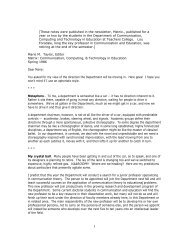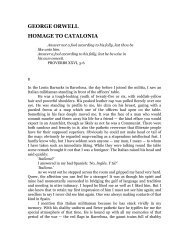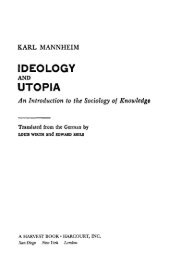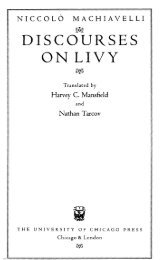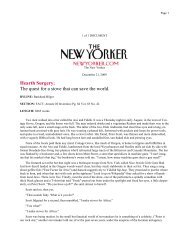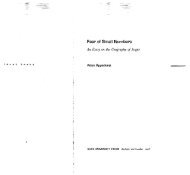THE REPUBLIC OF PLATO - Studyplace
THE REPUBLIC OF PLATO - Studyplace
THE REPUBLIC OF PLATO - Studyplace
Create successful ePaper yourself
Turn your PDF publications into a flip-book with our unique Google optimized e-Paper software.
INTRODUCTION<br />
and assurance as in dealing with other things, and so missing whatever<br />
value those other things might have' (505 E, p. 216). To possess<br />
this good would be happiness; to know it would be wisdom;<br />
to seek the knowledge of it is what Plato means by philosophy. If it<br />
is true that this knowledge can be gained only by highly gifted natures<br />
after a long course of intellectual discipline and practical experience,<br />
then it is hard to deny the central paradox of the Republic,<br />
that the human race will never see the end of troubles until p0<br />
litical power is entrusted to the lover of wisdom; who has learnt<br />
what makes life worth living and who will 'despise all existing<br />
honours as mean and worthless, caring only for the right and the<br />
honours to be gained from that, and above all for justice as the one<br />
indispensable thing in whose service and maintenance he will reorganize<br />
his own state' (540 D, p. 262).<br />
In such terms the author of the earliest Utopia in European literature<br />
confronts the modern reader with the ultimate problem of<br />
politics: How can the state be so ordered as to place effective control<br />
in the hands of men who understand that you cannot make<br />
either an individual or a society happy by making them richer or<br />
more powerful than their neighbours So long as knowledge is valued<br />
as the means to power, and power as the means to wealth, the<br />
helm of the ship will be grasped by the ambitious man, whose<br />
Bible is Machiavelli's Prince, or by the man of business, whose<br />
Bible is his profit and loss account. It is Plato's merit to have seen<br />
that this problem looms up, in every age, behind all the superficial<br />
arguments of political expediency. Every reader will find<br />
something to disagree with in Plato's solution, even when transposed<br />
into terms appropriate to modern conditions; but if he will<br />
seriously ask himself why he disagrees and what alternative he can<br />
propose, the effort will help him to clear his own mind. Plato's<br />
purpose will then be achieved, at least in part; for he never forgot<br />
the lesson of Socrates, that wisdom begins when a man finds out<br />
that he does not know what he thinks he knows.



